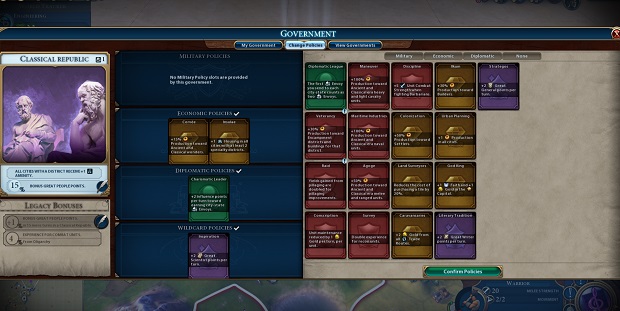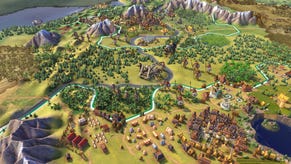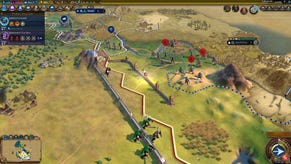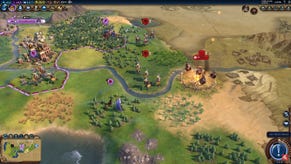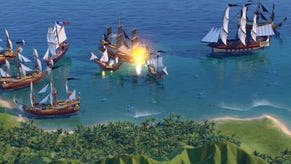The Quest For The Holy Grail: Civ VI Diary Part Two
My cup runneth over
This is the second part of a Civilization VI diary, running from the beginning of recorded history to the atomic age and victory (?). Part one is here.
"He's not the Messiah, he's a very naughty Great Prophet."
No, scratch that. Wrong Python movie.
“Spanish persons, today the blood of many a brave samurai shall be avenged! In the name of Horace, we shall not stop our fight till every one of you lies dead, and the Holy Grail returns to those who Horace Himself has chosen!”
This entry of my Civilization VI [official site] diary is about my quest for the Holy Grail.
The Grail Quest, eh? It may seem like a story more likely to spring from an RPG rather than a historical 4X strategy game, and that's precisely why its the story that I want to tell. Civ VI is absolutely packed with flavour, from the unique art and literature created by its named Great People, to the names of civic policies that make government more than a stack of numbers (an early example; Discipline gives a bonus to attack vs barbarians, and is the initial stage in formalising your military).
In both my preview and the first part of this diary, I wrote about how the design of the game forces changes to short- and long-term strategies, rewarding flexibility. Little did I imagine, I'd be proving that point to a ludicrous extent by involving myself in a prolonged grudge war with Spain over the rights to a holy relic. I'll admit that the Spanish found the Grail first, but that doesn't mean it belonged to them. It belonged in a museum. Well, a temple actually. Relics go in religious buildings, and art and literature have buildings of their own as well.
Artists can generally create three works, which is enough to fill most galleries, but there are bonuses for mixing and matching pieces by different creators. In the Industrial age, my Kyoto has an art museum with a Bosch, a Donatello and a Qui Ying.
I'll be talking about the industrial age and the renaissance in the next diary though. Today, I'm going to tell you about the Classical and Medieval eras in my coastal kingdom of Japan, and how I put the Spanish to the sword in Toledo.
Last time out, I'd started a war with Rome by stealing a settler. Things escalated quickly and I found myself at war with Scythia as well, the declaration coming hot on the heels of my betrayal of the Romans. That tied into the Scythian leader's primary trait – she hates surprise wars even more than everybody else does.
All of this ties into a couple of the new diplomacy features. First of all, there are those traits, one primary one unique to each civilization and a pool of secondary ones, allocated randomly at the beginning of each playthrough, and hidden from the player. Trajan, my Roman frenemy, has a primary trait that sees him wanting lots of land for himself, and respecting anyone who manages to build a mighty empire. If you're too small, he'll gobble you up.
Through a combination of trading posts, delegates and technological advances, I learned that Trahan's second trait was Cultured, meaning he likes to amass art and other niceties, and looks down on nation's that lack such things. I learned that long after our war had ended and it explained a lot – primarily, it explained why our war was bloodless.
Once the initial shock of losing his settler had worn off, Trajan didn't seem to have his heart in the whole affair. A few chariots lurked at the edges of my territory but as soon as I sent my own troops in their direction, he asked if we could call the whole thing off. I twisted the metaphorical dagger a little and filled my treasury with his peace offering and a couple of hundred years later, he'd become my closest friend.
In retrospect, I realise that's because I was concentrating all of my efforts on cultural advances and had, as planned, expanded to five cities relatively early in the game. I was exactly Trajan's type and he couldn't help but want to be my buddy.
Philip was my problem. The Spanish leader is driven by religion, wanting to convert everyone he meets and hating anyone who so much as thinks about sending a missionary in his direction. I wasn't going to trouble his citizens' faith but we were sharing borders, both on my Western side where we'd met naturally in the middle of the landmass we started our civs on, and on my Eastern side, where he'd managed to squeeze a settler onto the one free piece of land in the middle of all my cities. That's a dick move and I was not happy about it.
Not everyone gets their own religion in Civ VI, as the Great Prophets that form them run dry before every civilization has earned one, but I'd managed to snag the last of them so I had created a faith for my people. What made Philip's territorial aggression doubly irritating is that I'd purposely customised my religion – Horation Odelay - I did have my own religion but I'd purposely customised it so as not to antagonise my Spanish neighbour. Crafting a religion allows you to make it fit your own needs and I'd made sure my followers were self-contained, permitting me to make better use of my super city districts rather than spreading out into the world.
And yet despite my pious politeness, Philip still planted Toledo in the middle of Japan. Clearly, this aggression would not stand.
As soon as I developed the tech that gave me the unique Japanese unit, Samurai, I reckoned I could build the greatest army of the age. I churned them out, all five cities turned over to military training for a few decades, and I had an army that brought even those who were constantly denouncing me cooing to my door. “Those Samurai are awful nice, with such shiny swords”, they said, offering gift bundles and more kind words.
Philip just abused me, too foolish to realise a day of reckoning was coming.
When you make a deal with an AI civ, you can see all of the valuable things they have that you might want: cities, amenities, resources, cash, works of art...and relics. I'd been demanding that Philip not convert my cities or settle near me for a while, and he'd agreed not to do those things and then done them anyway. So before the war started I called him out on his behaviour, threatened him and demanded the one relic he had in his possession as reparation. The Holy Grail.
I wanted it because my goal, in this playthrough, is to win a tourism victory. To do that, I'd need attractive cities, packed with glorious buildings and wonderful works of art. The Grail would bring in the punters for sure, and I didn't have any way to make relics of my own. Some religions, as far as I can gather, can have their apostles (usually used to create new beliefs, expanding the religion's abilities, or to spread the faith around the world) create relics when they fall. That was denied to me and I hated seeing relic slots in my temples sitting empty.
Part of my annoyance came from the Japanese guild of unemployed writers. I'd attracted three great writers to my land and the bastards were sitting around sitting in the medieval equivalent of a coffeehouse gabbing and griping about how they'd finish that one Great Japanese Novel they had in mind if they could only summon up the energy or get over their latest saké hangover. Layabouts, the lot of them.
It was my own fault, of course. I'd attracted all these writers but had no buildings that could house their works, so they were essentially without purpose. This is something I'm learning about on my route to a tourism victory; Great Artists/Writers/Sculptors aren't worth their weight in marble if your cities can't host their works. Because attracting these people takes effort in and of itself, it's wise to direct that effort to the right ends.
Relics are easy to find a home for though, given that religious buildings are cheap and readily available in the early eras. That Holy Grail would make one of my cities shine.
My Samurai forces swept into Toledo en masse, accompanied by siege towers that allowed them to ignore the city walls. Not a single unit fell and when we'd taken the city centre, we had the option to raze the city or claim it as our own. I didn't particularly want it, as despite its presence right in the middle of my territory, it wasn't on particularly fertile or useful land. I didn't want to burn it down though because my other neighbours still thought of me a something of a troublemaker.
I hadn't realised that I could so easily use it as a bargaining chip. I claimed Toledo as my own and the very next turn, Philip got in touch to tell me that he wanted peace, BUT he wanted me to return the city to him. He was willing to pay handsomely but I was only interested in one thing. I asked for the Grail (and a huge pile of gold) in exchange for the city. He agreed and I placed it in Kyoto's temple.
A symbol of another king's faith, a reminder of conquest and humiliation, and – above all – a very handsome cup that people would almost definitely want to take photos of a few hundred years down the line.
(side note: I love the strategic map, pictured above)
Tourism is a long game and no matter how popular my cities were as attractions, I wouldn't benefit until the modern era at the earliest. I was playing other games as well though, my cultural advances so ahead of their time that I was a full two eras ahead of two of my neighbours.
That's important because Civ VI introduces the concept of casus belli, reasons to fight that lessen the negative diplomatic impact of declaring war, and with the colonial civic tech, any nation two eras ahead of another can declare war for almost no relationship loss in the wider world. A grim historical truth that I was determined to take advantage of as I subdued Philip, preparing to dominate and destroy him completely once I could industrialise my military forces.
All that was to come though. For now, I had the Grail, I had my gaggle of disaffected writers and I had walls bristling with cannons. Japan was the most powerful nation in the known world but we heard rumours of other nations across the sea. It was time to visit the unknown world, and to see how the other half lived.
In part three, Japan meets America and a bond is forged, Spain burns, and the writers finally get to work. For more on Civilization VI, follow our coverage here.




